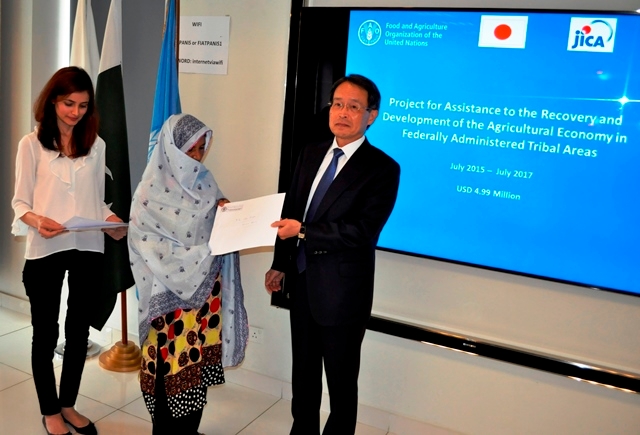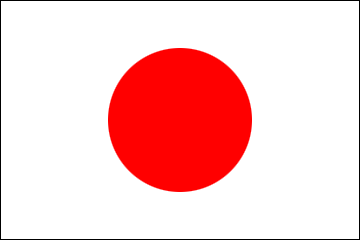FAO JICA Project for Restoring FATA's Agricultural Economy
2017/8/3
PRESS RELEASE N0: JPNEMPAK 17-23
PRESS RELEASE
Displaced persons returning to FATA receive assistance from FAO and JICA to secure agriculture based livelihoods
Islamabad; August 1, 2017: Farmer households in Khyber and Kurram agencies of FATA have received assistance from the Food and Agriculture Organization of the United Nations (FAO) with the help of Japan International Cooperation Agency (JICA) to rebuild their lives as they continue to return to their homes after years of displacement.
77,200 households (33,143 in Khyber and 44,057 in Kurram agency) of FATA received this assistance which helped the returning small holder farmers to produce food and earn income for their families.
This assistance was provided to the farmers under the Project for Assistance to the Recovery and Development of the Agricultural Economy in FATA. The project that concluded on July 31st, accomplished restoration of farm productivity and agriculture based livelihoods by rebuilding productive assets, and strengthening the productive skills of the returnees, and by developing capacity of the public and private sector service providers.
A ceremony was held at the FAO Representation office in Islamabad to mark the conclusion of the project. It was attended by the Ambassador of Japan, H.E. Mr. Takashi Kurai, Chief Representative of JICA Pakistan, Mr. Yasuhiro Tojo, top officials from development agencies and representatives of the government of Pakistan.
Speaking on the occasion, Mr. Takashi Kurai, Ambassador of Japan to Pakistan said “We had supported recovery of FATA including rehabilitation of community infrastructure. In addition to these assistant to provide these basic services, the recovery of livelihood of returnees is very important for stable lives of returnees and stable return of TDPs and this project is a part of these assistance. Japan will continue assisting people of Pakistan including returnees in FATA and TDPs to keep peace in this country.”
Mr. Yasuhiro Tojo, Chief Representative of JICA Pakistan Office while expressing his views said “One of the most important components of this project was the capacity building of women, who are vastly contributing to the agricultural economy of the region, therefore, to train them to impart the appropriate knowledge on farming and livestock was crucial to ensure the sustainability of FATA”.
Highlighting the achievements of the project Ms. Minà Dowlatchahi, FAO Representative to Pakistan said: “It is important that we assist the government of Pakistan in fulfilling its responsibilities in enabling the safe return of the displaced persons to their homes. In this connection, we appreciate our strategic partnership with JICA. With the support from JICA and the Embassy of Japan in Pakistan, FAO has assisted a significant number of displaced persons and helped them begin a better life by revitalizing agriculture based livelihoods, economy and contributing to a more stable society. We hope that this partnership will continue so that we can play our part in ensuring better and healthier lives for the people of FATA.”
Farmers were provided high quality seeds for wheat, maize, oats and different vegetables. They also received help for keeping their livestock healthy. Land was reclaimed to make it fit for cultivation and irrigation channels constructed to provide water for the crops.
Secretary Production and Livelihood , FATA Secretariat, Mr. Abdul Latif Khan appreciating the project said: The assistance from JICA and the Embassy of Japan in Pakistan not only helped the FATA people to fulfil their economic and food security pressing needs but also played an important role in maintaining peace in the area by creating livelihoods and job opportunities. On behalf of the government of Pakistan and FATA Secretariat, I extend thanks to FAO for effective delivery of Japan’s assistance to the needy and vulnerable population in FATA.
A few farmers who had traveled to Islamabad to take part in this ceremony briefed participants on how they had benefitted from this project.
Background Information for editors
The economy of the FATA region is based on subsistence agriculture and livestock rearing providing livelihood to about 97% of the population. The economic growth rate of FATA region has been historically significantly slower than rest of the country. The situation further accentuated with the military operation undertaken by the security agencies which led to involuntary exodus of population to settled areas in Khyber Pakhtunkhwa (KP) province as displaced persons. As per government policy they are being repatriated to their areas. In July 2015, FAO with the financial assistance of the Government of Japan launched the project to provide support for its Project titled, “Assistance to the Recovery and Development of the Agricultural Economy in FATA.” The end date of the project is 31 July, 2017.
A recent review of the project progress indicate that most of early returning households received assistance in restoring their economic activities and livelihoods, while the recently returned households are in the process of receiving assistance.
Displaced persons returning to FATA receive assistance from FAO and JICA to secure agriculture based livelihoods
Islamabad; August 1, 2017: Farmer households in Khyber and Kurram agencies of FATA have received assistance from the Food and Agriculture Organization of the United Nations (FAO) with the help of Japan International Cooperation Agency (JICA) to rebuild their lives as they continue to return to their homes after years of displacement.
77,200 households (33,143 in Khyber and 44,057 in Kurram agency) of FATA received this assistance which helped the returning small holder farmers to produce food and earn income for their families.
This assistance was provided to the farmers under the Project for Assistance to the Recovery and Development of the Agricultural Economy in FATA. The project that concluded on July 31st, accomplished restoration of farm productivity and agriculture based livelihoods by rebuilding productive assets, and strengthening the productive skills of the returnees, and by developing capacity of the public and private sector service providers.
A ceremony was held at the FAO Representation office in Islamabad to mark the conclusion of the project. It was attended by the Ambassador of Japan, H.E. Mr. Takashi Kurai, Chief Representative of JICA Pakistan, Mr. Yasuhiro Tojo, top officials from development agencies and representatives of the government of Pakistan.
Speaking on the occasion, Mr. Takashi Kurai, Ambassador of Japan to Pakistan said “We had supported recovery of FATA including rehabilitation of community infrastructure. In addition to these assistant to provide these basic services, the recovery of livelihood of returnees is very important for stable lives of returnees and stable return of TDPs and this project is a part of these assistance. Japan will continue assisting people of Pakistan including returnees in FATA and TDPs to keep peace in this country.”
Mr. Yasuhiro Tojo, Chief Representative of JICA Pakistan Office while expressing his views said “One of the most important components of this project was the capacity building of women, who are vastly contributing to the agricultural economy of the region, therefore, to train them to impart the appropriate knowledge on farming and livestock was crucial to ensure the sustainability of FATA”.
Highlighting the achievements of the project Ms. Minà Dowlatchahi, FAO Representative to Pakistan said: “It is important that we assist the government of Pakistan in fulfilling its responsibilities in enabling the safe return of the displaced persons to their homes. In this connection, we appreciate our strategic partnership with JICA. With the support from JICA and the Embassy of Japan in Pakistan, FAO has assisted a significant number of displaced persons and helped them begin a better life by revitalizing agriculture based livelihoods, economy and contributing to a more stable society. We hope that this partnership will continue so that we can play our part in ensuring better and healthier lives for the people of FATA.”
Farmers were provided high quality seeds for wheat, maize, oats and different vegetables. They also received help for keeping their livestock healthy. Land was reclaimed to make it fit for cultivation and irrigation channels constructed to provide water for the crops.
Secretary Production and Livelihood , FATA Secretariat, Mr. Abdul Latif Khan appreciating the project said: The assistance from JICA and the Embassy of Japan in Pakistan not only helped the FATA people to fulfil their economic and food security pressing needs but also played an important role in maintaining peace in the area by creating livelihoods and job opportunities. On behalf of the government of Pakistan and FATA Secretariat, I extend thanks to FAO for effective delivery of Japan’s assistance to the needy and vulnerable population in FATA.
A few farmers who had traveled to Islamabad to take part in this ceremony briefed participants on how they had benefitted from this project.
Background Information for editors
The economy of the FATA region is based on subsistence agriculture and livestock rearing providing livelihood to about 97% of the population. The economic growth rate of FATA region has been historically significantly slower than rest of the country. The situation further accentuated with the military operation undertaken by the security agencies which led to involuntary exodus of population to settled areas in Khyber Pakhtunkhwa (KP) province as displaced persons. As per government policy they are being repatriated to their areas. In July 2015, FAO with the financial assistance of the Government of Japan launched the project to provide support for its Project titled, “Assistance to the Recovery and Development of the Agricultural Economy in FATA.” The end date of the project is 31 July, 2017.
A recent review of the project progress indicate that most of early returning households received assistance in restoring their economic activities and livelihoods, while the recently returned households are in the process of receiving assistance.
- 21,192 Farmers supported with crop inputs
- 8 fruit and Agroforestry Nursery and 258 Fruit orchards rehabilitated
- 10 Fish farms and 1 Hatchery rehabilitated
- 1200 Seed silos provided
- 200 Acres pasture developed for livestock production
- 200 Vegetable production units established
- Restocking and poultry packages to 3800 Households
- 1200 Chopping machines and milk collection kits distributed
- Animals vaccination and De-worming to 4200 HH
- Rehabilitation of 100 Water harvesting structures and water channels
- Land Reclaimed 1151 Ha
- 75 Micro Irrigation Units established
- Restoring 200Ha degraded land to Prod. range and forest
- Soil conservation practices 50 Ha of land
- 130 Farmers Field Schools (FFS)
- 80 Women Open Schools (WOS)
- 50 Farmers Business Schools (FBS)
- One Training Need Assessment (TNA) of Govt. Line Agencies
- Three ToTs for Govt. line departments
- 19 ToF (Training of Facilitators) for women farmers
- 8 ToF (Training of Facilitators) for male farmers
- Establishment of green sector line dept. forum
For further information, please contact:
Waqas Rafique, Communications Officer, FAO, Cell: 0333-5752274, Email: Waqas.Rafique@fao.org
Sajid Abbasi, Embassy of Japan, Phone: 51 907-2500, Email: sajid.abbasi@ib.mofa.go.jp
Zubair Muhammad, JICA Pakistan Office, Phone: 51 924-4500, Email: ZubairMuhammad.PT@jica.go.jp

